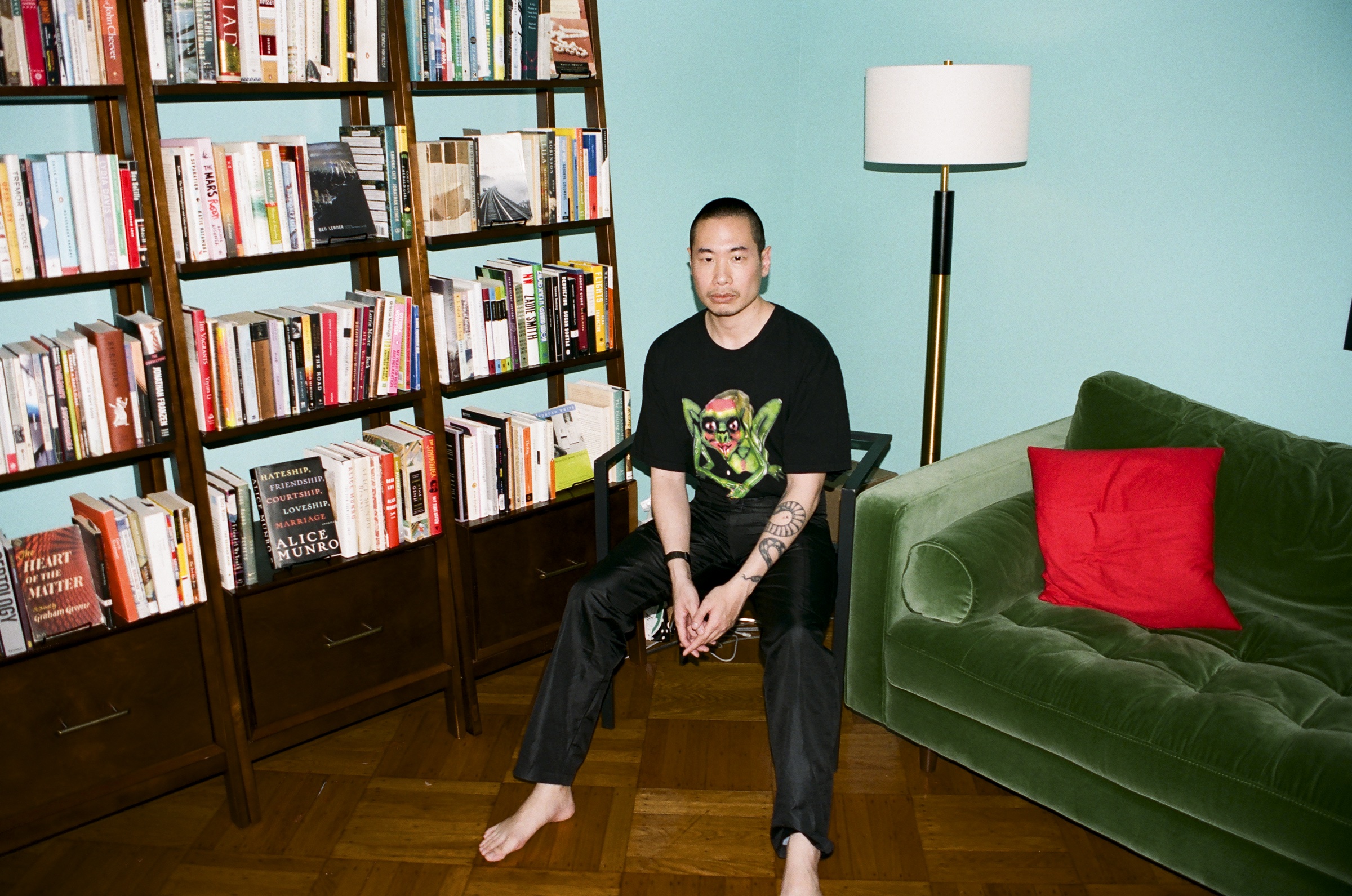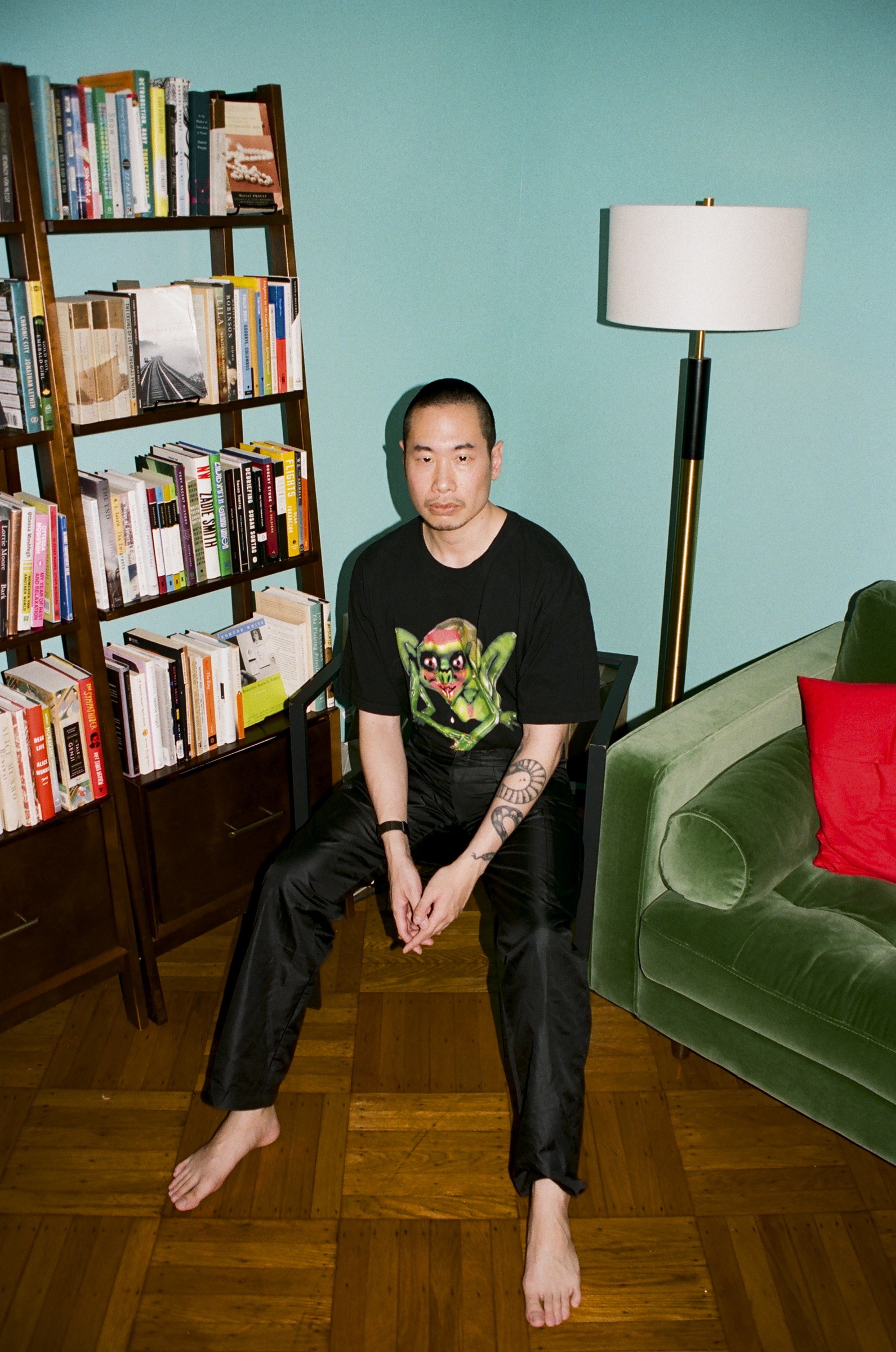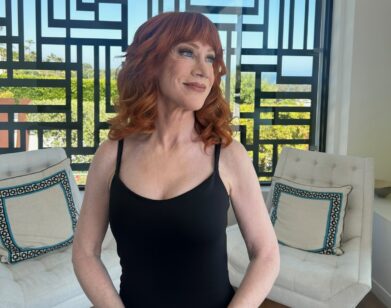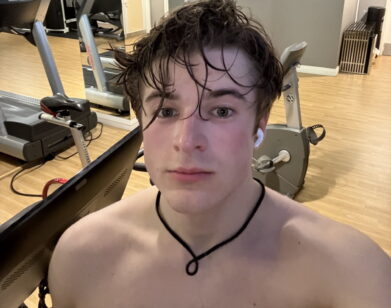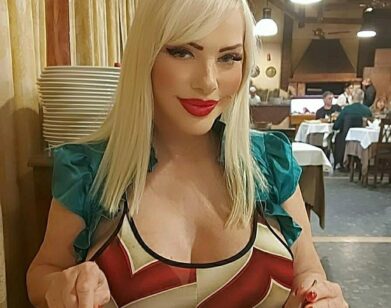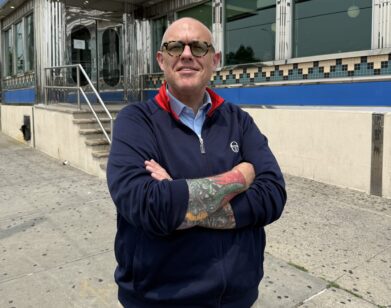LIT
Geoffrey Mak Still Hasn’t Lost Hope in the Personal Essay
Last month, when I spoke to the writer and critic Geoffrey Mak about his debut collection of essays, Mean Boys, a white flower petal floated into his coffee just as he explained how he came to reconcile with his father, a firebrand conservative minister who features prominently in one of the book’s standout pieces, a tough but largely merciful account of their strained relationship and the indignities of the Evangelical church. It was a storybook moment that struck me as almost inappropriately mawkish, since Mak is not one for heavy sentiment. In Mean Boys, he applies a fierce intellect and a certain defiant posture to subjects as varied as edgelords, art fairs, raves, agitprop, organized religion, and mass murderers, but the conclusions reached are rarely tidy or comforting. Paranoia, distrust, and violence, Mak argues, are the defining sensibilities of these strange times. But we nevertheless retain our capacity for joy and intimacy, to be found, perhaps, in the random kindness of a stranger on the dance floor, or in the act of writing itself. “When I write, I care less about admiration and more about connection,” Mak explained. “And this very rich expansion of the soul can only happen with the personal essay.” Just before his book’s release, he and I got together downtown to talk about pain, pleasure, Trump, trad caths, and the Kardashians.
———
NEVINS: I finished the title essay last night. I feel like I should tell you up front that a very dear friend of mine grew up with Elliot Rodger and is mentioned by name in his manifesto. She’s actually working on this short in which she imagines his mother getting the call about the murders. So that was heavy on my mind as I was reading.
MAK: Oh, wow. Yeah, the mom. I tried not to do the whole “what went wrong” thing. I don’t think anyone wanted my speculation. But I felt really bad for her because like, she wasn’t that Asian parent who wouldn’t give positive affirmation. She really did, and she really had a kind of infinite patience. I don’t think Elliot was going out of his way to portray her well and she still came out pretty loving. So I feel really bad for her. Yeah, I would definitely watch this short.
NEVINS: I’ll keep you posted. Anyway, I was reading the title essay through the lens of your author’s note, in which you kind of riff on the uses and abuses of the personal essay. I’m curious to know what the utility of the form is for you, particularly in regard to these pieces.
MAK: Oh my gosh, I’m so opinionated on this. Where do I start? The personal essay now is really evolving. There are usually two directions it takes. I mean, everybody hates it. So the question is, “How do we make this less hateable?” And you either have one of two choices, which is to make it more like fiction or to make it more like journalism. And I think the pressure to push it in the direction of journalism is to back it up with research or reporting. So it’s like, this was my childhood in the church. Now I’m going to give you the history of the Presbyterian Church in America over the last couple centuries, and then I’m going to go back to myself.
NEVINS: And then in section four, we’ll do some scene work and actually go back to the church you had disavowed…
MAK: Yes, we’ve all read it. And I do really enjoy these essays. But specifically with Elliot Roger, I wanted to ask the question of what role pain has to do in our self-reported personal essays? Because I think our culture gives enormous authority to pain, but that also depends on who you are. If your pain is femme, queer, or non-white, it’s going to be respected as a source of authority. But we don’t seem to give a lot of aesthetic value or respect to stories of class deprivation. And then, in terms of status deprivation, there’s almost no discussion whatsoever because I don’t think our culture understands that status is real. But instead of using pain as a badge, there are other ways to represent it in literature, such as using it to disarm yourself and to become more open to relationships. I mean, something that really excites me about writing a memoir is the intense intimacy I will have with strangers I might never meet. I wanted to open the door to strange and intense intimacies. When I write, I care less about admiration and more about connection. And this very rich expansion of the soul can only happen with the personal essay. It’s special to me.
NEVINS: Yeah, I agree with that. I’m curious if it is any more or less strange than the intimacies that you write about experiencing more fleetingly while, say, K-holed on a dance floor. Those people will presumably know far less about you than your readers.
MAK: That’s true. But I am pretty much an open book. My boyfriend was like, “I’ve never met someone so unembarrassable before.” I write pretty openly about these years-long dry spells where I just wasn’t having any sex. And I think what happened during those years is that my brain and body and soul became really sensitive to opportunities for other kinds of intimacy other than sex. I think that wouldn’t have been the case if I were having a regular sex life. There are so many kinds of intimacy. I was listening to a lecture by the poet, Jorie Graham, and she was talking about how there’s a layer of intelligence in the human mind that is universal, and that’s the sensory one. Another thing about intimacy is that it doesn’t actually require knowledge. So when you’re on the dance floor, you’re radically intimate with all of these people moving together in the same direction, like a flock of birds. It’s really intimate to feel intense, purposeless joy.
NEVINS: I loved the section about how you assume a sort of maternal posture on the dance floor as the person whose job it was to sort of track everyone else’s highs. You and McKenzie Wark are writing more perceptively about nightlife than most people.
MAK: That book’s [Raving] amazing.
NEVINS: Yeah, that book’s great. But it does feel like the exception, since a lot of nightlife writing is just like, name-droppy.
MAK: That’s true. Speaking of, I feel a little bad. I wrote a lot about my dad and I didn’t write a lot about my mom, and I’m actually much closer to my mother.
NEVINS: Well, that doesn’t surprise me after reading about your dad.
MAK: I know…
NEVINS: Has he read it?
MAK: He got the book on Sunday.
NEVINS: You couldn’t get him a galley?
MAK: I didn’t want to because I wanted to give him a finished copy. I was like, “Is it okay if you don’t read certain essays?” And he was like, “Geoff, it’s fine. It’s not going to be a big deal.” I can’t imagine him opening the table of contents and reading the title, My Father, the Minister and not reading it immediately.
NEVINS: It’s so hard, but we’re powerless. When I was 18 and had just moved to New York, I wrote this cringe essay in New York Magazine about getting paid for sex by a very famous artist who was 50 years older than me. It was my very first byline and I didn’t name him. I was like, “Mom, I was published in New York Magazine. But you can’t read it.” I assume she went online and read it anyway.
MAK: If I was more assertive about it, I think my dad would’ve respected it. But I mean, it’s a little bit selfish for me because it actually doesn’t make a huge difference. I wanted to protect him from certain things, but if he’s like, “It’s not a big deal,” then I’d be like, “Yeah, you know yourself. I’ll trust you.” It’s tricky because there’s the essay in the book about my father and then there’s the New Yorker one, which is basically the same exact material, but kind of truncated. But in the New Yorker one, I wanted to celebrate my dad. I wanted to tell the world that it was possible for a firebrand conservative to actually change his mind. But when I wrote the one in the book, I was in utter rage. The one in the book makes me look good. I’m the wronged one. I’m the one with the emotional strength to be like, “I forgive you.” But in the New Yorker one, I look really bad. I’m the burnout, the drug addict. I’m the one who goes home penniless and my dad says, “Yeah, I’ll take you in.” I think it’s a fuller story.
NEVINS: Well, having read them both, I think this raises interesting questions about form. Narratively, in the container of the personal essay, did you not feel that both of these truths could coexist? By which I mean, do you feel that particular story, as it exists on the page, requires the tension of a character who’s plainly virtuous and one who’s not?
MAK: Well, the two of them together is a story of mutual forgiveness and at the end of the book version, I had this epiphany that we forgive people not because we think they can earn it one day. That’s not how forgiveness works. If you can earn forgiveness, that’s just called penance. What forgiveness really means is that we forgive someone because they can never earn it. There’s this moment where I call my father a coward. It’s pretty harsh, but I had asked him if he’d tell his church about me and he said no. So this kind of really intense failure is actually why I forgive him.
NEVINS: There’s no way a flower petal just fell into your coffee.
MAK: Right as we got to the moment of forgiveness. And to see him change made me radically optimistic about what the human heart is capable of. This isn’t in the book, but I did return to Christianity. Watching my dad model what a Christian was capable of made it quite appealing to me. I left Christianity and embraced queerness. And then when I came back to Christianity, I didn’t leave queerness. I brought it with me. I began reading some hard theology, and by “hard theology” I mean theology that’s meant for theologians. Liberals and leftists really hate Christians. And I’m not surprised. They have reason to. I hate them too. But all of the criticisms that the left has of Christianity, theology has answered them. People just don’t care enough to read it. It’s easier to have a target that’s demonized, and what’s more easy to demonize than the Evangelical church. I mean, they’re awful. But my whole life has been about finding tiny minorities that I could find a home in. I was never going to find a big movement that I felt was speaking to me. So there were the raves, there was theology, there was X, Y, and Z. But the stuff is out there, and it’s really thrilling.
NEVINS: This makes me curious to hear your thoughts on what you might call the kind of shallow iteration of religiosity coursing through downtown New York these days, which seems to me more reactionary than genuinely inquisitive.
MAK: Oh my god, yeah. Well, it is a little reactionary. Obviously, edgelords are a really big theme in the book. It’s hard to say what’s really going on there. Okay, tinfoil hat coming on. I had this epiphany when I was watching The Kardashians. You have this family that’s probably voting liberal. I mean, Caitlin isn’t, but I think most of the family is. But the show itself is a resounding endorsement of conservative ways of being, so to have this culture so loud and syndicated everywhere is to really promote a conservative way of life. And then I began to think of Trad Caths and like, you have all of these people in Dimes Square who are certainly voting liberal.
NEVINS: Well, if they’re voting at all.
MAK: Right, or they’re not voting. But them doing the hard work of stylizing Christianity and Catholicism and making it look cool is actually endorsing a kind of conservative constituency. I can’t not have a little bit of affection for the Trad Cath movement. I kind of love it on some level. I think it’s hilarious. Some people say to me, “Oh, but they’re not real.” They’re not real practitioners, they don’t actually believe. And I’m just like, “I’m not here to police that. I’m not ever here to police who’s the real Catholic, who’s the real trans, who’s the real leftist.” We can have rings of participation and intensities and seriousness.
NEVINS: Well, it’s interesting you say that. It’s such a rhetorical cudgel, but in the last several months I’ve experienced being told I’m not a “real Jew” for being pro-Palestine, which is really frustrating because I’m not only proud to be Jewish, but I also very much partake in all its cultural traditions, which I understand to be a spirit of community and fellowship and intellectual inquiry.
MAK: Who’s saying that to you?
NEVINS: Well, it mostly comes from Zionists. And I hate to create some sort of hierarchy, but the people saying that are certainly not any more observant than I am. They just seem to think that Zionism endows them with some totally arbitrary authority to decide who really is and isn’t Jewish. So I very much appreciate that despite having returned to Christianity yourself, you don’t take it upon yourself to police its other variants.
MAK: I kind of love the Praying shirts without the praying. I don’t have one. The moment’s a little bit over. But I have a little bit of affection.
NEVINS: I want to talk about Edgelords real quick because I think it’s a really impressive and expansive essay. Forgive me if I’m misstating the thesis, but—
MAK: I mean, it’s kind of messy. There are multiple theses.
NEVINS: Chief among them is that you’re identifying paranoia as the spirit of our age. Sometimes it can feel like we’re too close to an era or a scene to really assess it accurately. You write about the ways you were driven to what you call “madness.” I’m curious how you came to this organizing theory of the times.
MAK: Oh my gosh, there’s so much to say. There was a fundamental shift in how politics mobilized culture for its own advantages. There’s this excellent book, Kill All Normies by Angela Nagle. And if anybody reads it now, they’ll be like, “Duh, this is obvious.” But it really wasn’t when it came out. And basically the observation is that before, we thought politics would get to the center of culture and move out from there, just sending out the signals from the center and it’ll reach everyone eventually. And what Nagle tracked was that culture didn’t work top-down anymore. It actually worked bottom-up. You had very obscure communities that were disparate, fragmented, but they were meeting each other online, such as gamers, and they were interacting regularly, and they were organically growing really intense political beliefs and affinities. So if you look at Hillary versus Trump, they didn’t work from the center. Well, Trump was better at doing this than Hillary, but Trump was like, “I’m going to endorse the gamers and then I’ll get them on my side. I’m not going to create the gamers. I’m not going to tell them what to do. I’m just going to look for these obscure things.” So sometimes he would tweet things that only 200 people were meant to see.
NEVINS: Just so I’m understanding correctly, you’re suggesting that, as opposed to dictating to what might be a potential voting bloc or constituency, his politics were instead kind of subordinated to theirs?
MAK: He would pick people who already agreed with him.It was more about signals. Suddenly, signals became really important in a way that I don’t think they were before. I mean, the trans bathroom thing. That was really a Tumblr thing. Just a lot of young people on Tumblr were getting really up in arms about it. And then I think the Democratic Party was like, “Oh, it’s burgeoning in the underground, we need to get ahead of this now.” And then they did. So suddenly this very obscure Tumblr thing became a national discussion. That is kind of how culture works now, but it’s also due to the collapse of the mainstream-underground binary. Now, everyone kind of has their own micro-tribe, which is utterly illegible to other micro-tribes even though they might live a couple blocks away from each other. I mean, we feel that in New York, even just looking at Tribeca versus the Lower East Side. The art worlds that exist in the two are so different, yet they’re so close. And then, to go back to the point about paranoia, the Cambridge Analytica revelations were almost as big as the NSA revelations to me. I don’t think my friends cared as much as I did. But for some reason, I was just really locked onto it. To see how the campaign was explicitly stoking paranoia in their favor was absolutely alarming to me. And then I began to look at the culture and see all of these patterns of paranoia, and this was also happening concurrently with my own psychological degradation. It’s so funny, because the paranoid would see patterns, but as a paranoid, I began to see patterns of paranoia, which actually is what Eve Sedgwick writes about—how paranoia simply looks for itself. I actually see Mean Boys as a more morally and psychologically advanced text than Edgelords. In a way, Mean Boys rejects paranoia and decides to welcome in something that is toxic and harmful, which one might call a reparative gesture. The paranoid always pushes things out, and instead, I wanted to let something in, but without compromising judgment.
NEVINS: There was something really sobering about Mean Boys. You render Elliot Rodger almost grossly human, but I didn’t feel as though you were subject to his manipulations, which I guess is what people worry about when they clutch their pearls about writers “humanizing” bad guys.
MAK: I think it goes back to forgiveness. I’ll never say I forgive Elliot Rodger. I was not the one who was harmed. But I think there’s an affect that doesn’t have a name, where you hold love and judgment together without one diminishing the other.
NEVINS: Well, you could call that love.
MAK: You’re right. I love that. That’s just love.
NEVINS: Anyway, what are you reading these days?
MAK: I’m literally four pages in, but I am reading Then the War by Carl Phillips. I’m reading a lot of poetry these days. Oh my god, so good. He’s kind of a poet for sentence writers. I think prose writers really like him. And being a prose writer myself, I really like it.
NEVINS: I feel that way about Vijay Seshadri.
MAK: Oh, I should read them. I’ve been reading a lot of Louise Glück.
NEVINS: That makes sense.
MAK: Does it? That’s so funny. I’ve been reading the collections back to back. It’s funny because when you get a 70-page poetry book in the mail, you really can read in one sitting. So I’m just inhaling it. What are you reading?
NEVINS: I just finished Adelle Waldman’s new novel. It’s been like, 10 years since her last one.
MAK: Since [The Love Affairs of] Nathaniel P.
NEVINS: I fucking love that book.
MAK: Oh my god, the best. One of the people I dedicate my book to is allegedly the man that Nathaniel P. Is based off of.
NEVINS: Wait, oh my god.
MAK: Yeah, it’s him.
NEVINS: Well, we won’t name him on the record. But if anyone’s curious, go buy Geoff’s book.

